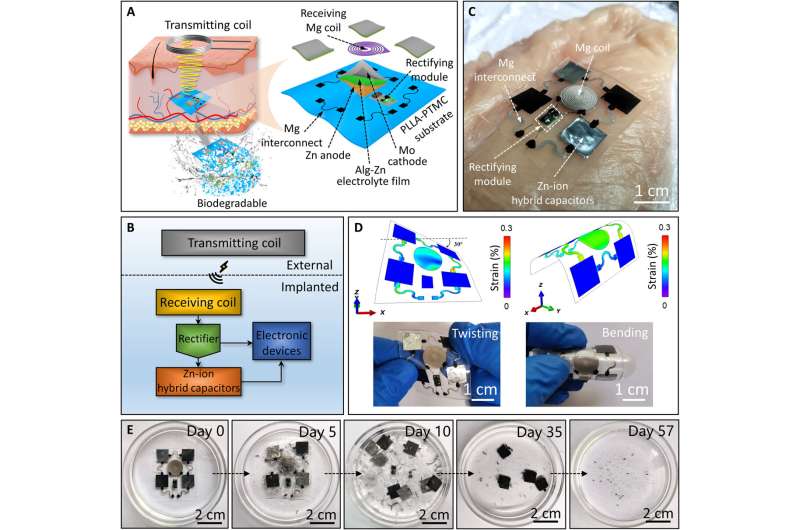
A team of bioengineers from Lanzhou University, Dalian University of Technology and Qinghai Normal University, all in China, working with a pair of colleagues from Pennsylvania State University in the U.S., have developed a soft, implantable supercapacitor that can power implantable devices. In their paper published in the journal Science Advances, the group describes how their supercapacitor was made and its performance during testing.
Prior research has shown that implantable devices can be developed for use in monitoring or treating a variety of ailments. Unfortunately, the means to power such devices is still lagging. In this new study, the research team developed a new way to power such devices by using a supercapacitor instead of a battery. A supercapacitor, unlike batteries, stores electricity in its electrical form; batteries store chemical energy—this makes supercapacitors not only more flexible, but lighter.
The supercapacitor created by the researchers had to have a feature unlike others in use in other nonmedical applications—every part of it had to be both biodegradable and harmless to the patient as it degraded. The supercapacitor the team developed was made using a zinc foil as an anode, a molybdenum sulfide as a cathode and an alginate gel to serve as the electrolyte. A second magnesium coil, placed on the skin above the part of the body where the supercapacitor was implanted, was used for wireless charging.
The supercapacitor was tested first to make sure that as it degraded it did not exceed recommended health allowances for the materials it was made from. It was then connected to a previously developed implantable medication dispensing device that also biodegrades. The combined device was then implanted into mice with fevers induced by yeast infections. The researchers added medicine to the device, which was implanted into the test mice. After a short period of time, the mice with the implanted devices were found to have lower-grade fevers.
The team acknowledges that more work is required before their supercapacitor is ready for use in human patients—a means for shutting it down, for example, has not yet been developed.
More information:
Hongwei Sheng et al, A soft implantable energy supply system that integrates wireless charging and biodegradable Zn-ion hybrid supercapacitors, Science Advances (2023). DOI: 10.1126/sciadv.adh8083
Journal information:
Science Advances
Source: Read Full Article
